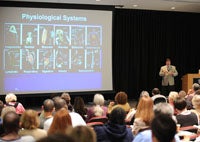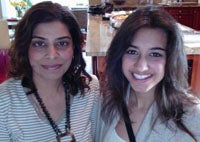A Backyard of Resources Without a Fence

Posted in GUMC Stories
 Students gather and a hum of excitement builds over rustling notes and handouts. Eagerly, men and women settle in their favorite unassigned seats, flip-up the writing desks and get down to work. It’s 7:00 p.m., the amount of anticipation seemingly incongruous for a weeknight.
Students gather and a hum of excitement builds over rustling notes and handouts. Eagerly, men and women settle in their favorite unassigned seats, flip-up the writing desks and get down to work. It’s 7:00 p.m., the amount of anticipation seemingly incongruous for a weeknight.
There are a few slight differences from the average medical student; some of these students have more seasoned looks with some youthful faces peppered in the crowd. Dressed in everything from business suits to jeans, most of them arrive at the Georgetown University Medical Center campus from their day jobs.
This has been the norm on Tuesday evenings for several years as community members are welcomed onto the Georgetown University Medical Campus to take part in Mini-Medical School, a two hour program, once a week for eight weeks, that provides comprehensive tutorials on a very special topic, the human body. For fifteen years, neighbors have engaged in the educational experience, learning from School of Medicine professors, doctors, and researchers who follow a curriculum that mirrors a first-year medical student’s educational track.
Herbert Herscowitz, Ph.D., directs the program with Carlos Suarez-Quian, Ph.D., striving to offer an enriching educational program that assists participants in navigating personal care, as well as sharing insights on popular medical conditions.
“We started this program fifteen years ago to extend our educational strengths to the surrounding community,” Herscowitz says. This gesture of good faith and neighborly approach has extended to the community’s backyard as well as knowledge base.
Anita Blau, a Georgetown resident, is taking part in the Spring 2012 course and is excited to be part of the learning opportunity. “The lectures are given by the same professors that teach the medical students, but they are able to simplify the information so that it makes sense even without a medical background,” she explains.
 The program is comprehensive, offering dynamic lectures with question and answer sessions, opportunities to view medical research up close with visits to the gross anatomy lab, videos of medical procedures, and richly displayed PowerPoint presentations that enhance the experience.
The program is comprehensive, offering dynamic lectures with question and answer sessions, opportunities to view medical research up close with visits to the gross anatomy lab, videos of medical procedures, and richly displayed PowerPoint presentations that enhance the experience.
Retired educator Nickie Neary is a veteran Mini-Med student, nearing her 10th year of participation in the program. She loves the interaction between participant and doctor, and enjoys the sense of community that is formed around each course.
“I’ve met medical students who are now doctors and we keep in touch through this unique experience,” she says. It’s these interactions and a quest to be a lifelong learner that keeps her coming back year after year.
Monu Harnal, a participant in the course, reaffirms Neary’s sentiments. Attending Mini- Med School for the first time with her niece, Bhavya P. Dhingra, a college freshman enrolled at Northern Virginia Community College who dreams of one day becoming a doctor, is a special, shared experience. Harnal is a yoga instructor and Georgetown resident, who is pleased to be part of a neighborhood with such enriching opportunities for the community.
“To see doctors from such a prestigious hospital as part of our community, it makes them more approachable, more reachable,” Harnal commented.
Dhingra’s young face stands out among the older attentive faces in the audience who yearn to know more. Her youthful spirit and aspiration to one day attend medical school and treat patients in a general practice with a holistic approach captures the importance of engaging our community and educating our future leaders.
Bringing awareness and empowerment, there’s nothing “mini” about this educational opportunity.
By Katherine Brazauskas, GUMC Communications
(Published April 9, 2012)
